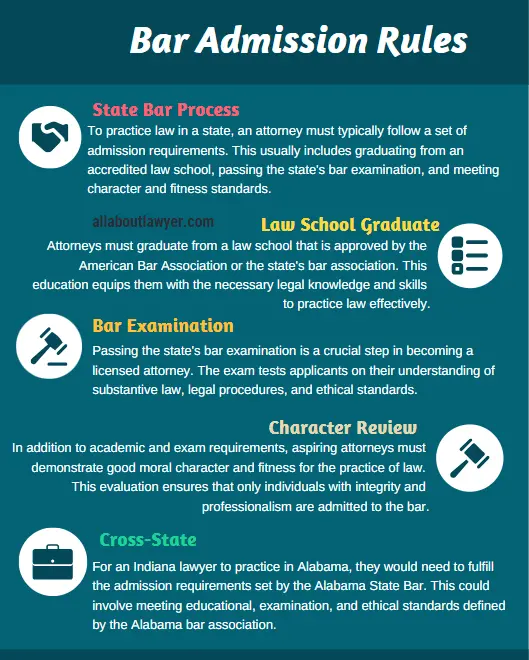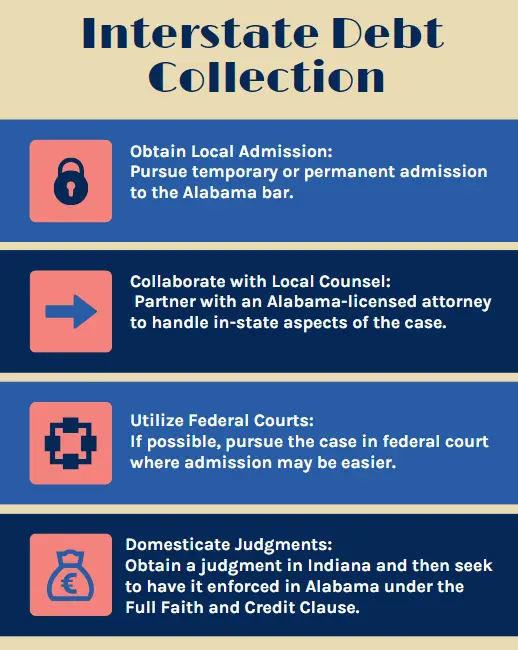Can an Indiana Lawyer Collect a Debt in Alabama?
In the realm of interstate debt collection, questions often arise about the ability of attorneys to pursue debts across state lines. A common inquiry is whether a Hoosier state attorney can engage in debt recovery in the Yellowhammer state. This article will explore Can an Indiana Lawyer Collect a Debt in Alabama? And their complexities of cross-state legal practice and the various factors that come into play when an Indiana counsel seeks to collect debts in Alabama.
Table of Contents
Understanding Interstate Legal Practice
Before delving into the specifics of Can an Indiana Lawyer Collect a Debt in Alabama, it’s crucial to understand the broader context of interstate legal practice. Each state has its own bar association and rules governing the practice of law within its borders. This system of state-specific regulation can create challenges for attorneys seeking to represent clients in multiple jurisdictions.
State Bar Admission Requirements
Typically, to practice law in a state, an attorney must be admitted to that state’s bar. This process usually involves:
1. Graduating from an accredited law school
2. Passing the state’s bar examination
3. Meeting character and fitness requirements
For an Indiana barrister to practice in Alabama, they would generally need to meet these requirements for the Alabama State Bar.

Options for Out-of-State Practice
Despite the general requirement for state-specific bar admission, there are several ways an Indiana lawyer might be able to pursue Alabama collections:
1. Pro Hac Vice Admission:
This temporary admission allows an out-of-state attorney to practice in a specific case in another state’s courts.
2. Multi-State Bar Admission:
Some lawyers are admitted to practice in multiple states.
3. Partnering with Local Counsel:
An Indiana attorney might work with an Alabama-licensed lawyer to handle the case.
4. Federal Court Practice:
If the debt collection case falls under federal jurisdiction, an attorney admitted to federal court practice may be able to handle the case across state lines.
The Role of the Interstate Commerce Clause
The U.S. Constitution’s Interstate Commerce Clause can play a role in cross-state debt collection. This clause gives the federal government the power to regulate commerce between states, which can impact how debts are collected across state lines.
Full Faith and Credit Clause Considerations
Another relevant constitutional provision is the Full Faith and Credit Clause, which requires states to respect the “public acts, records, and judicial proceedings of every other state.” This can be particularly important when enforcing judgments obtained in one state in another state’s courts.
Uniform Laws and Interstate Debt Collection
Several uniform laws have been developed to address issues of interstate commerce and legal practice, including debt collection. These include:
1. The Uniform Enforcement of Foreign Judgments Act
2. The Uniform Interstate Depositions and Discovery Act
While not all states have adopted these uniform laws, they can provide a framework for interstate legal cooperation.
Federal Laws Governing Debt Collection
Regardless of state boundaries, certain federal laws apply to debt collection practices nationwide. The most notable is the Fair Debt Collection Practices Act (FDCPA), which sets standards for debt collection practices and applies to all states.
State-Specific Debt Collection Laws
In addition to federal regulations, both Indiana and Alabama have their own laws governing debt collection practices. An attorney practicing across state lines would need to be familiar with and comply with the laws of both states.
Ethical Considerations in Multi-State Practice
Legal ethics play a crucial role in multi-state practice. Attorneys must navigate the ethical rules of both their home state and the state where they seek to practice. This can include issues such as:
1. Unauthorized practice of law
2. Conflicts of interest
3. Client confidentiality
4. Advertising and solicitation rules
Practical Challenges of Interstate Debt Collection
Beyond legal and ethical considerations, there are practical challenges to collecting debts across state lines:
1. Distance:
Physical distance can make it difficult to attend court hearings, meet with clients, or conduct investigations.
2. Familiarity with Local Courts:
Each court system has its own procedures and local rules, which can be challenging for out-of-state attorneys to navigate.
3. Establishing Jurisdiction:
Proving that a court has jurisdiction over an out-of-state debtor can be complex.
4. Service of Process:
Serving legal documents to an out-of-state party requires adherence to specific procedures.
Strategies for Effective Interstate Debt Collection
For an Indiana lawyer seeking to collect a debt in Alabama, several strategies might be employed:
1. Obtain Local Admission:
Pursue temporary or permanent admission to the Alabama bar.
2. Collaborate with Local Counsel:
Partner with an Alabama-licensed attorney to handle in-state aspects of the case.
3. Utilize Federal Courts:
If possible, pursue the case in federal court where admission may be easier.
4. Domesticate Judgments:
Obtain a judgment in Indiana and then seek to have it enforced in Alabama under the Full Faith and Credit Clause.
5. Leverage Technology:
Use video conferencing and electronic filing systems to manage cases remotely when possible.

The Future of Interstate Legal Practice
As commerce becomes increasingly interstate and even global, the legal profession is adapting. Some trends that may impact interstate debt collection in the future include:
1. More uniform laws facilitating interstate practice
2. Increased reciprocity between state bars
3. Greater use of technology in legal practice
4. Potential federal reforms to streamline interstate commerce and legal practice
Conclusion
While it is possible for an Indiana lawyer to collect a debt in Alabama, the process involves handling a complex web of state and federal laws, ethical considerations, and practical challenges. The most straightforward approach often involves collaborating with local counsel or obtaining temporary admission to practice in the state where the debt is being collected.
As the legal landscape continues to evolve, it’s crucial for attorneys engaged in interstate practice to stay informed about the latest developments in multi-jurisdictional law and debt collection regulations. By understanding and adhering to the rules governing interstate legal practice, attorneys can effectively serve their clients’ interests across state lines while maintaining ethical and professional standards.
FAQs
Q: Can an Indiana lawyer directly represent a client in an Alabama court for debt collection?
A: Generally, an Indiana lawyer cannot directly represent a client in an Alabama court without being admitted to the Alabama bar or obtaining pro hac vice admission for that specific case.
Q: What is pro hac vice admission?
A: Pro hac vice admission is a legal provision that allows an out-of-state lawyer to practice in another state’s court for a specific case, usually with the sponsorship of a locally licensed attorney.
Q: Are there any federal laws that allow lawyers to practice across state lines for debt collection?
A: While there are federal laws governing debt collection practices, such as the FDCPA, they don’t automatically grant lawyers the right to practice across state lines. Federal court admission may allow practice in federal courts across states.
Q: How can an Indiana lawyer collaborate with an Alabama lawyer for debt collection?
A: An Indiana lawyer can partner with an Alabama-licensed attorney, where the Alabama lawyer handles in-court appearances and state-specific legal matters while the Indiana lawyer contributes expertise on the case details.
Q: Does a judgment obtained in Indiana automatically apply in Alabama?
A: Not automatically. However, under the Full Faith and Credit Clause, an Indiana judgment can be “domesticated” or registered in Alabama, after which it can be enforced like an Alabama judgment.
About the Author

Sarah Klein, JD, is a former consumer rights attorney who spent years helping clients with issues like unfair billing, product disputes, and debt collection practices. At All About Lawyer, she simplifies consumer protection laws so readers can defend their rights and resolve problems with confidence.
Read more about Sarah
